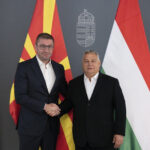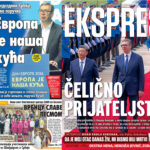- North Macedonia has new president who doesn’t recognize country’s new name
Gordana Siljanovska-Davkova, who was nominated by the opposition party VMRO-DPMNE, became the new president of North Macedonia.
Stevo Pendarovski, who ran for re-election with the ruling Social Democratic Union of Macedonia (SDSM), lost the run-off that took place on May 8, suffering a crushing defeat.
29% voted for Pendarovski, 65% – for Siljanovska-Davkova.
On May 12, the representative from VMRO-DPMNE, Gordana Siljanovska Davkova, was sworn in as president of the country, which she referred to as “Macedonia”, despite the fact that the official text of the president’s oath reads “North Macedonia”.
The name “Macedonia” was changed to “North Macedonia” as part of the accords between Skopje and Athens recorded in the Prespa Agreement. After the former Yugoslav Republic of Macedonia, was renamed Greece unblocked its entry into NATO and the EU.
VMRO-DPMNE and the current president of the country, Siljanovska-Davkova, opposed the renaming and never publicly use the new name.
The position of the new government of North Macedonia has already led to complications in relations with Greece.
After the incident at the inauguration, the Greek Ministry of Foreign Affairs officially stated that further progress in bilateral relations with North Macedonia, as well as the country’s European course, depend on the full implementation of the Prespa Agreement and, including as regards the use of the country’s constitutional name.
- Winner of parliamentary elections in North Macedonia launches negotiations on creating government coalition
The patriotic coalition led by VMRO-DPMNE became the leader of parliamentary elections in North Macedonia. 43.2% of the voters who took part in the voting supported this political force. VMRO-DPMNE will receive 58 seats out of 120 in the new parliament.
The European Front (created based on a member of the ruling coalition, the Albanian Democratic Union for Integration, DUI) received 13.8% and can now count on 19 mandates.
The ruling Social Democratic Union of Macedonia (SDSM) (15.4%) will receive only 18 seats.
The coalition of opposition Albanian parties VLEN (VREDI) sealed 10.7% and will have 13 mandates.
The pro-Russian party Levica saw 6.8% of support and will seal six mandates.
Left-patriotic movement “ZNAM Za nasura Macedonia”: 5.6% and 6, respectively
The VRMO-DPMNE party that won the parliamentary elections in North Macedonia on May 8 and the Albanian opposition coalition VLEN (VREDI) have already reached an agreement on the main principles of forming a government coalition, including European integration.
However, the declared reluctance of VMRO-DPMNE to fulfill the agreements reached earlier with Greece and Bulgaria for the sake of European integration may suspend the process the country’s European integration.
- Serbia, China agree to expand strategic partnership
The Presidents of Serbia and the People’s Republic of China, Aleksandar Vucic and Xi Jinping, signed in Belgrade the Joint Statement of the two countries on deepening and expanding the comprehensive strategic partnership and building a community with a shared future in a new era.
“The Republic of Serbia and the People’s Republic of China are moving from the strategic relationship to which we managed to raise our bilateral relations to the common future of our two countries. This is the highest form of cooperation between the two states,” Vucic said after signing the document.
After the Joint Statement was signed off, the members of the delegations of Serbia and China exchanged 28 documents, memoranda of cooperation and mutual understanding in the fields of infrastructure, trade, research, ecology, technology, culture, sports, and information.
The parties paid special attention to public statements about respect for the sovereignty of both countries. Vucic said Belgrade supports the One China principle, while Xi Jinping said China respects Serbia’s territorial integrity and advocates keeping Kosovo within Serbia’s borders.
Vučić and Xi Jinping were expected to mark the 25th anniversary of the NATO bombing of the Chinese embassy in Belgrade, but the leaders ultimately chose to avoid the topic.
There came no public reports about the negotiations on the purchase of Chinese weapons by Serbia, although Belgrade previously announced continued cooperation with Beijing in the defense area.
- Serbian ambassador returns to Ukraine
This was announced by the President of Serbia, Aleksandar Vucic, on May 13, after a meeting with the Minister for Foreign Affairs of Ukraine, Dmytro Kuleba.
“The Ambassador of Serbia will return to his duties in Kyiv in the near future,” Vučić wrote on social media.
Kuleba, together with the spouse of the President of Ukraine, Olena Zelenska, visited Belgrade on May 12-13. This was the first visit of Ukraine’s high-ranking official to Serbia since Russia invaded Ukraine in February 2022.
According to Vučić, the President of Serbia and the Head of the Ministry of Foreign Affairs of Ukraine “agreed on the improvement of bilateral relations, with a special willingness to organize an economic forum between businesses from the two countries in the near future.”
On X, the Ukrainian minister, after a meeting with Prime Minister of Serbia Milos Vucivic, announced the arrangements for holding the first meeting of the Ukrainian-Serbian Intergovernmental Commission on Trade, Economic and Scientific-Technical Cooperation since 2013.
Vucevic also noted that he discussed with Minister Kuleba “problems facing Serbia, especially at the international level.” This may mean that the real purpose of the negotiations in Belgrade was to try to convince Kyiv not to support the decisions that are posing the biggest challenge for Serbia at the moment: Kosovo’s accession to the Council of Europe and the UNGA Resolution on the Srebrenica genocide.
- Right-wing conservative government coalition formed in Croatia
The Prime Minister of Croatia and the head of the HDZ party, Andrej Plenkovic, handed over to President Zoran Milanovic lawmakers’ signatures necessary for obtaining a mandate for forming a new government.
HDZ leader managed to collect 78 of those (a minimum of 76 was required).
Sixty-one signatures were provided by representatives from the HDZ, 12 by the Homeland Movement (Domovinski pokret), four by those representing national minorities (except Serbs), and one more deputy.
The first meeting of the Croatian Council (Parliament) is scheduled for May 16.
Although Plenkovic is expected to remain in office, the new Croatian government will pursue a more right-wing conservative policy, due to its participation in the Patriotic Movement government coalition.
- Albanian Prime Minister Edi Rama meets with diaspora in Athens
Albanian-Greek relations and the need to improve them, not only for the benefit of the two countries, but also for the entire region, were the focus of a long address that Albanian Prime Minister Edi Rama delivered on May 12 in Athens to several thousand Albanian diaspora representatives. Rama said that Albanians and Greeks should move forward as equals, leaving behind the past and problems that he said were mainly caused by politics. “Albania has no claims to Greece, other than mutual respect and concern for compatriots living in our two countries, as well as mutual friendship and good neighborliness,” he stressed, noting that his country “sees Greece as a natural strategic partner.”
The meeting in Athens is the first in a tour of several European cities where Rama plans to meet compatriots living outside Albania.
The visit of the prime minister of Albania to Greece was preceded by heated debates in Greek political circles. The opposition regarded his meeting with Albanian immigrants as a “provocation,” and Greek Prime Minister Kyriakos Mitsotakis called it “unnecessary.”
Edi Rama’s visit, which was announced as private, came amid worsening Greek-Albanian relations following the jailing of the ethnic Greek mayor-elect of the Albanian town of Himara, Fredi Beleri, accused of vote-rigging. Athens considers Beleri’s two-year sentence a violation of the rights of Albania’s Greek minority.
Beleri’s verdict has angered Greece, which has announced the intention to block Albania’s EU accession talks if it fails to respect the rights of Himara’s elected mayor. In addition, Greek authorities announced in April that Beleri, who is in now in prison, will be a candidate in the June 9 European Parliament elections with the ruling New Democracy party.



